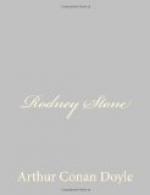“It won’t do, Sir Charles,” said the smith, shaking his head. “There’s nothing would please me better, but you heard for yourself.”
“Well, if you won’t fight, Harrison, I must try to get some promising colt. I’d be glad of your advice in the matter. By the way, I take the chair at a supper of the Fancy at the Waggon and Horses in St. Martin’s Lane next Friday. I should be very glad if you will make one of my guests. Halloa, who’s this?” Up flew his glass to his eye.
Boy Jim had come out from the forge with his hammer in his hand. He had, I remember, a grey flannel shirt, which was open at the neck and turned up at the sleeves. My uncle ran his eyes over the fine lines of his magnificent figure with the glance of a connoisseur.
“That’s my nephew, Sir Charles.”
“Is he living with you?”
“His parents are dead.”
“Has he ever been in London?”
“No, Sir Charles. He’s been with me here since he was as high as that hammer.”
My uncle turned to Boy Jim.
“I hear that you have never been in London,” said he. “Your uncle is coming up to a supper which I am giving to the Fancy next Friday. Would you care to make one of us?”
Boy Jim’s dark eyes sparkled with pleasure.
“I should be glad to come, sir.”
“No, no, Jim,” cried the smith, abruptly. “I’m sorry to gainsay you, lad, but there are reasons why I had rather you stayed down here with your aunt.”
“Tut, Harrison, let the lad come!” cried my uncle.
“No, no, Sir Charles. It’s dangerous company for a lad of his mettle. There’s plenty for him to do when I’m away.”
Poor Jim turned away with a clouded brow and strode into the smithy again. For my part, I slipped after him to try to console him, and to tell him all the wonderful changes which had come so suddenly into my life. But I had not got half through my story, and Jim, like the good fellow that he was, had just begun to forget his own troubles in his delight at my good fortune, when my uncle called to me from without. The curricle with its tandem mares was waiting for us outside the cottage, and Ambrose had placed the refection-basket, the lap-dog, and the precious toilet-box inside of it. He had himself climbed up behind, and I, after a hearty handshake from my father, and a last sobbing embrace from my mother, took my place beside my uncle in the front.
“Let go her head!” cried he to the ostler, and with a snap, a crack, and a jingle, away we went upon our journey.
Across all the years how clearly I can see that spring day, with the green English fields, the windy English sky, and the yellow, beetle-browed cottage in which I had grown from a child to a man. I see, too, the figures at the garden gate: my mother, with her face turned away and her handkerchief waving; my father, with his blue coat and his white shorts, leaning upon his stick with his hand shading his eyes




